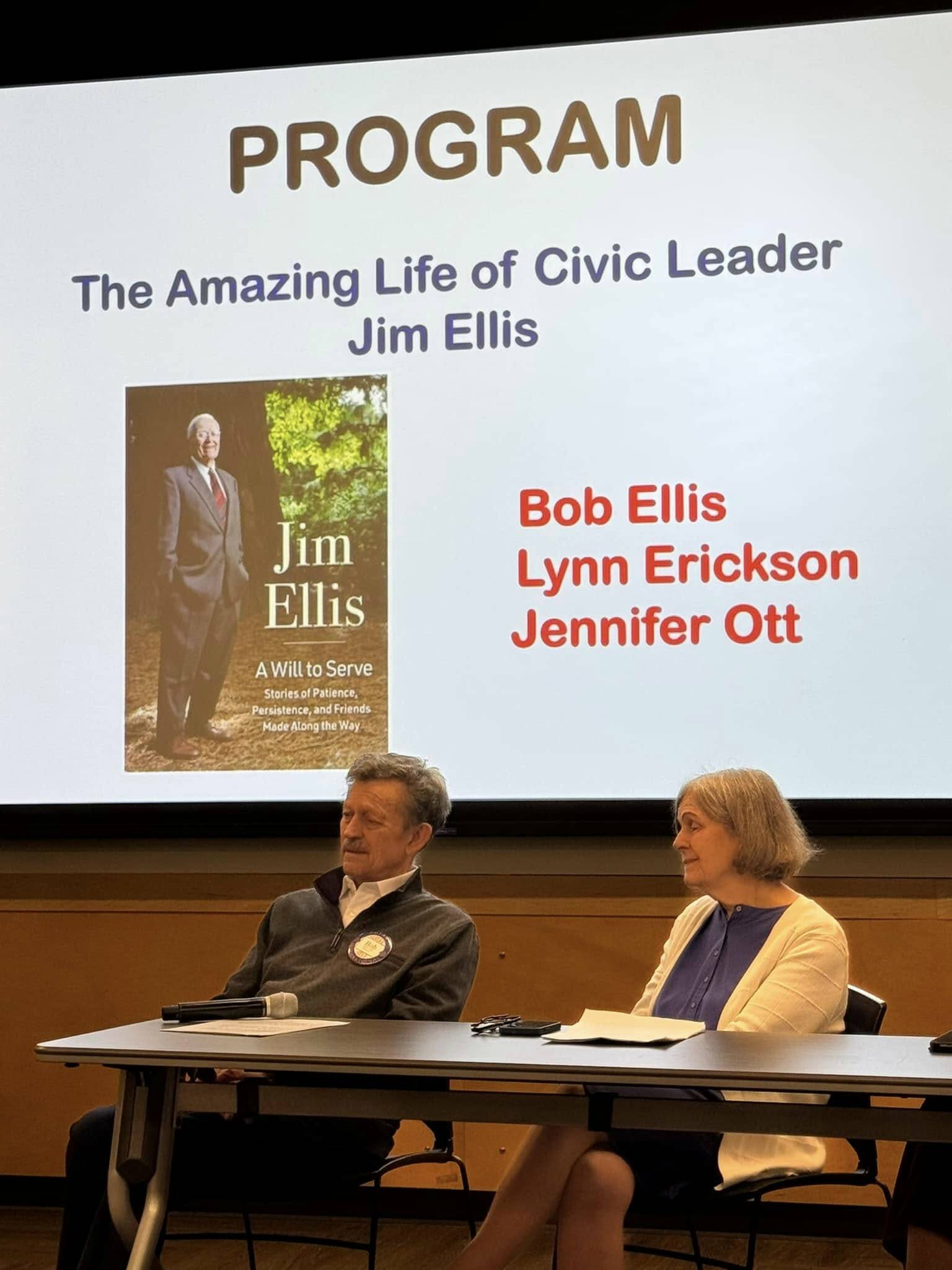Jim Ellis changed my life. He also changed your life, and the lives of everyone who lives in Seattle, this metropolitan region, Washington state, and many other places around the nation and the globe.
Jim died in 2019 at the age of 98, but his legacy lives on. Just look around and you’ll see lasting evidence of his extraordinary career. A partial list of his achievements:
Cleanup of polluted Lake Washington in late 1950s.
Creation of Metro sewage treatment agency.
Forward Thrust measure to fund parks, Kingdome and Seattle Aquarium in 1960s.
Farmland Preservation Act in 1970s.
Construction of Convention Center in 1980s.
Creation of Mountains to Sound Greenway in 1990s.
Did he do these alone? Of course not, but he was the unique and inspiring leader who made them all possible. I contend that he did more for any city or region as an unelected citizen volunteer than any single individual has ever done for any city in the country, if not the world.
The Rotary Club of Mercer Island (mirotary.org) remembered Jim last week in an extraordinary program, “The Amazing Life of Jim Ellis.” He was a member of Rotary, whose motto is “Service Above Self.” Jim personified those words.
Copies of a great new book, “Jim Ellis – A Will to Serve,” were available for sale. It’s his autobiography but was still unfinished when he died. The Ellis family brought in historian Jennifer Ott of HistoryLink.org to complete the book. It’s a must-read for anyone who wants to understand what made this area what it is today.
Jennifer, plus Jim’s son Bob Ellis and daughter Lynn Erickson, did a panel recalling Jim. They combined a video, photos, memories and anecdotes about his life.
I introduced them by describing how I first met Jim shortly after joining The Seattle Times’ editorial board in 1977. I asked my boss, Herb Robinson, who were the most influential leaders in town. He said I should call Jim Ellis. We met at his office and talked for two hours.
He asked if I had read Alexis DeTocqueville’s Democracy in America, published in 1835. I may have lied and said yes, but at least I knew of the book. Jim paraphrased DeTocqueville: “The greatest thing about America is that when a group of citizens see a problem, they form a committee to solve it.” I never forgot that. I believe it’s still true today.
In a speech in Seattle in 1998, Jim said: “The safety of liberty rests upon the everyday duties of life, the willingness of citizens to pursue the common good, to teach their children well, to defend justice, to be stewards of the planet and to respect each other.”
Those last three words can be challenging these days, as we are deeply polarized about many issues, policies and personalities. But it was Jim’s genius to work around differences and seek common ground. His constant goal was to hear all sides, listen carefully, understand each other’s positions, find compromises and get results.
As Jennifer told MI Rotary, “He would to into a meeting with an outcome in mind, but if things failed, he would just try again.”
Jim also personified the old saying that “There’s no limit to the amount of good you can do it you don’t care who gets the credit.”
He never sought accolades, although he got many: the First Citizen Award from the Seattle-King County Association of Realtors, a national Jefferson Award, a member of the Ford Foundation’s board of trustees, and a Lifetime Achievement Award from American Lawyers.
In 1998, a small group of us decided to start the Washington News Council, an independent, nonprofit, organization that was a kind of “outside ombudsman” to encourage fairness, accuracy, and balance in the news media. I called Jim for his advice.
We met for dinner at Salty’s on Alki and explained how it would work. After asking lots of probing questions, Jim said: “It’s a good idea. Go for it.” He was the first to join our founding board, which gave us instant credibility. Because of his endorsement, our board soon included Bill Gates Sr., Charley Royer, Bill Ruckelshaus, Mike Lowry, Patsy Bullitt Collins, Roz Woodhouse, Denny Heck, Suzie Burke and others. It was a truly bipartisan, blue-ribbon, volunteer citizens’ committee.
The WNC held open, transparent public hearings on complaints against the news media by those who felt damaged by inaccurate, unfair or biased stories about them. We also did 15 annual “Gridiron West Dinners” when we “roasted and toasted” prominent people with parody songs and personal testimonials. When we roasted Jim, Bill Gates Sr. spoke and teared up when he talked about their long friendship as law partners at Preston Gates & Ellis.
In an afterword in the book, former Gov. Gary Locke wrote: “Whenever you encountered Jim, he had boundless energy, impatience and humility. Whenever he pitched his projects or ideas he had this almost uncontrollable excitement that captured and drew you in.”
Locke concluded: “We need more Jim Ellises – with his imagination, tenacity, selflessness, and enthusiasm – because it will take several leaders to match the impact of the one Jim Ellis….If we truly care about our future, we can’t be dissuaded by the enormity of the challenge, the prospect of defeat, or years of hard work. We just need to do it. That’s how we honor the legacy of Jim Ellis.”
As we face today’s seemingly unsolvable problems, Jim Ellis should be a role model for every one of us.
John Hamer (jhamer46@gmail.com) is a former Seattle Times editorial writer/columnist and co-founder of the Washington News Council. He has lived on Mercer Island for 25 years and is now working with the city, MI Rotary and MI Preschool Association to make all parks and playgrounds on the island accessible and inclusive for everyone from disabled children to aging seniors.




